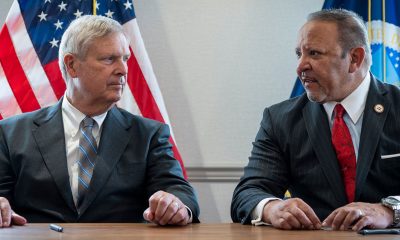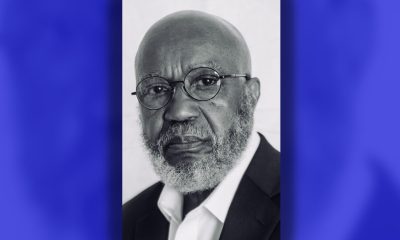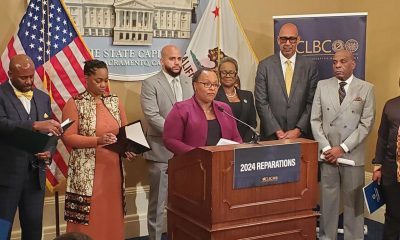Politics
Maine Has Nation’s Top Democracy; Alabama Ranks Last
By Freddie Allen
Senior Washington Correspondent
WASHINGTON (NNPA) – Lawmakers in South Carolina voted last week to remove the Confederate battle flag from the Statehouse grounds, but when it comes to access to democracy, the state still ranks among the worst in the country, according to a recent report by the Center for American Progress Action Fund.
The report by the fund, a sister group of the Center for American Progress, ranked all 50 states and the District of Columbia on 22 different factors that contribute to the overall health of state-level democracy and divided them into three categories: accessibility to the ballot box, representation in state government, and influence in the political system.
South Carolina received an ‘F’ letter grade for accessibility of the ballot, a ‘D+’ for diversity in representation in state government and an ‘F’ for laws that control influence in the political system.
But South Carolina was not the worst – that distinction belongs to Alabama (26.6 percent Black population).
The state with the healthiest democracy is Maine (1.4 percent Black population). North Carolina, Pennsylvania, New York, South Carolina, Mississippi, Indiana, Kentucky, Tennessee, Virginia joined Alabama at the bottom of the list ranking as the worst states when it comes to access to democracy.
Michele Jawando, the vice president of legal progress at the Center for American Progress Action Fund, said that access to the freedoms guaranteed under the Constitution is too often decided by where you live.
“Whether it is access to voting rights, representation in government, or the outsized influence of money in our political system, the opportunity to interact with and participate in democracy is available to some, but blocked for many,” said Jawando. “There are, however, many factors that make up a healthy democracy that should be evaluated in sum, not in silos, if solutions are going to have an overall effect.”
Those factors include availability of pre-registration, in-person early voting, online voter registration, diversity in representation, felony disenfranchisement laws and campaign contribution limits for individual donors.
“In one state, a citizen may have elected officials who are nearly representative of the state’s demographic makeup; in another, some groups may be woefully underrepresented,” the report explained. “One citizen may live in a state where elected officials are beholden to big money, while in the state next door, policymakers could be trying to counteract its influence.”
States that were forced to preclear any changes to their voting laws with the Justice Department prior to the United States Supreme Court decision in Shelby v. Holder which gutted the Voting Rights Act of 1965 also ranked near the bottom in access to the ballot box.
“While several of these states may perform well in other categories, each of the nine states that were covered in total by preclearance requirements performs poorly in accessibility of the ballot: They are ranked in the bottom half of all states in that section, and none gets a grade higher than a D+,” the report said.
In six of the nine states (Alabama, Georgia, Louisiana, Mississippi, South Carolina and Virginia) that were covered by the preclearance formula in Section 4 of the Voting Rights Act, Blacks account for a higher percentage of the population than the national average and are disproportionately affected by laws that block access to the voting booth.
“While several states, including California, Massachusetts, and Louisiana, have taken steps to expand pre-registration, North Carolina eliminated its pre-registration program as part of a package of voter restrictions in advance of the 2014 election, stated the report. “Currently, 14 states and the District of Columbia offer preregistration to 16- and 17-year-olds, while 36 states do not.”
The United States Supreme Court decision in Citizens United v. Federal Election Commission not only made it easier for groups that chose to support a given candidate campaigns to amass huge amounts of cash, the decision also made it harder for states to control the influence of money on the political landscape.
Nebraska had the weakest laws affecting public influence in the political system and Connecticut ranked first. Alabama, Indiana, Missouri, North Dakota, Ohio, South Carolina, Pennsylvania and Wisconsin received an “F” grade for weak policies affecting influence in the political system.
The report recommended that states pass measures making it harder for “lawmakers-turned-lobbyists” to cash in on their time in public office, online voter registration, same day voter registration and expanding early voting options.
“Nationwide, there has been a concerted attack on in-person early voting hours – with a particular focus on evening and weekend hours, the hours most likely to be used by people of color and by voters who do not have the luxury of leaving work to vote during daytime hour,” said the report.
States should also eliminate voter ID laws and pass legislation to restore voting rights to ex-offenders.
“According to The Sentencing Project, ‘denying the right to vote of an entire class of citizens is deeply problematic to a democratic society and counterproductive to effective reentry,’” stated the report. “States should provide either automatic restoration of voting rights or a transparent, affordable, well-publicized process to restore ex-offender voting rights after prison sentences have been served.”
The report concluded that every state had room for improvement, given their relative strengths and weaknesses related to access to the ballot, representation in government, and the political influence wielded by a few wealthy donors compared to the will of the majority.
“The suite of issues that make up an effective democracy are both diverse and inextricably interconnected,” said Lauren Harmon, the voting campaign director at the Center for American Progress Action Fund. “Solutions range from incremental to sweeping, but none is too small to help improve what is a broken system in many states.”
Harmon continued: “We have to ensure that all Americans have full access to their democracy by enacting policies that encourage fairness and engagement.”
Barbara Lee
Congresswoman Barbara Lee Issues Statement on Deaths of Humanitarian Aid Volunteers in Gaza
On April 2, a day after an Israeli airstrike erroneously killed seven employees of World Central Kitchen (WCK), a humanitarian organization delivering aid in the Gaza Strip, a statement was release by Rep. Barbara Lee (D-CA-12). “This is a devastating and avoidable tragedy. My prayers go to the families and loved ones of the selfless members of the World Central Kitchen team whose lives were lost,” said Lee.

By California Black Media
On April 2, a day after an Israeli airstrike erroneously killed seven employees of World Central Kitchen (WCK), a humanitarian organization delivering aid in the Gaza Strip, a statement was release by Rep. Barbara Lee (D-CA-12).
“This is a devastating and avoidable tragedy. My prayers go to the families and loved ones of the selfless members of the World Central Kitchen team whose lives were lost,” said Lee.
The same day, it was confirmed by the organization that the humanitarian aid volunteers were killed in a strike carried out by Israel Defense Forces (IDF). Prior to the incident, members of the team had been travelling in two armored vehicles marked with the WCF logo and they had been coordinating their movements with the IDF. The group had successfully delivered 10 tons of humanitarian food in a deconflicted zone when its convoy was struck.
“This is not only an attack against WCK. This is an attack on humanitarian organizations showing up in the direst situations where food is being used as a weapon of war. This is unforgivable,” said Erin Gore, chief executive officer of World Central Kitchen.
The seven victims included a U.S. citizen as well as others from Australia, Poland, the United Kingdom, Canada, and Palestine.
Lee has been a vocal advocate for a ceasefire in Gaza and has supported actions by President Joe Biden to airdrop humanitarian aid in the area.
“Far too many civilians have lost their lives as a result of Benjamin Netanyahu’s reprehensible military offensive. The U.S. must join with our allies and demand an immediate, permanent ceasefire – it’s long overdue,” Lee said.
Community
Financial Assistance Bill for Descendants of Enslaved Persons to Help Them Purchase, Own, or Maintain a Home
California Legislative Black Caucus (CLBC) vice chair Sen. Steven Bradford (D-Inglewood) introduced new legislation related to reparations to the Senate Committee on Housing on April 2 in Sacramento. Senate Bill (SB) 1007, “establishes the Homeowner’s Assistance for Descendants of Enslaved Persons Program to make financial aid or assistance available to descendants for the purposes of purchasing, owning, or maintaining a home,” the legislation states.
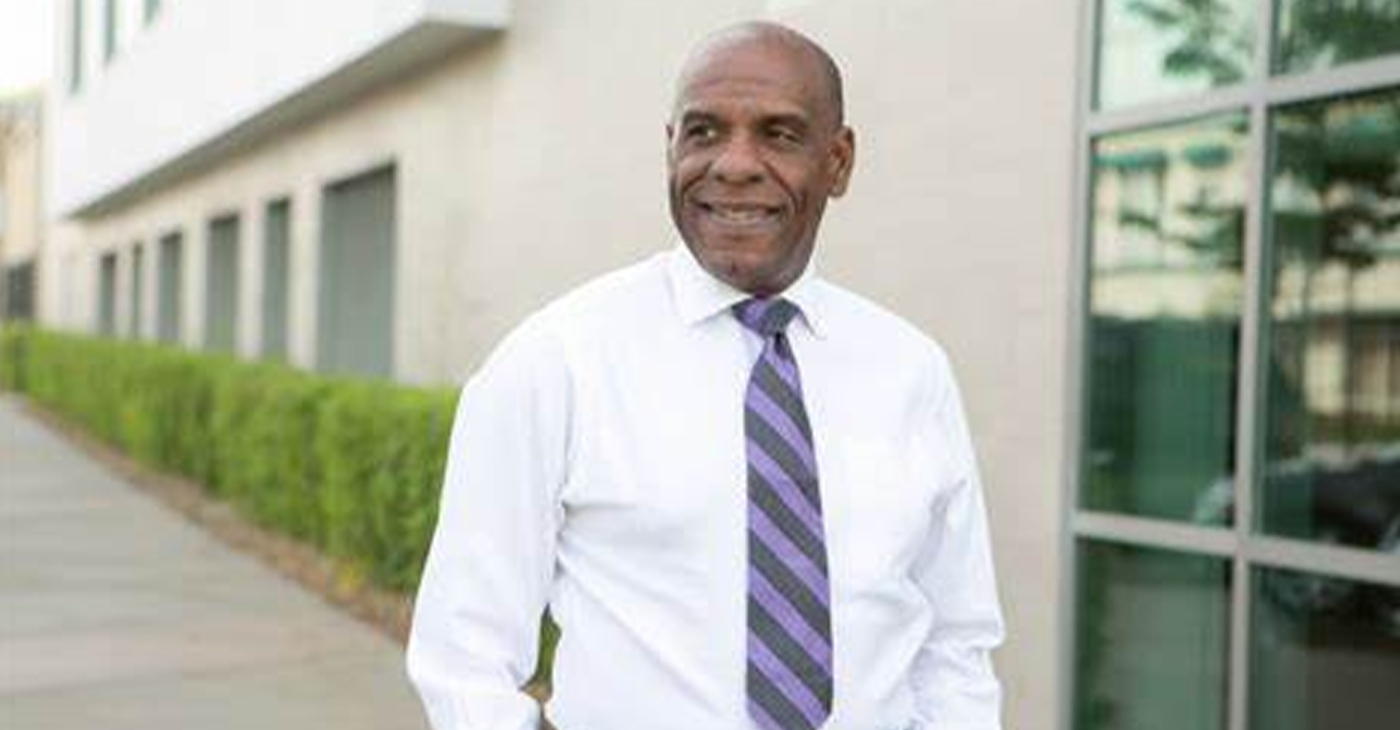
California Legislative Black Caucus (CLBC) vice chair Sen. Steven Bradford (D-Inglewood) introduced new legislation related to reparations to the Senate Committee on Housing on April 2 in Sacramento.
Senate Bill (SB) 1007, “establishes the Homeowner’s Assistance for Descendants of Enslaved Persons Program to make financial aid or assistance available to descendants for the purposes of purchasing, owning, or maintaining a home,” the legislation states.
The Senate Housing Committee advanced the bill with an 8-1 vote. It will be re-referred to the Appropriations Committee for consideration.
Sen. Kelly Seyarto (R-Murrieta) was the only member who voted against the bill.
“SB 1007 is about starting a long process of paying back a debt that is not only owed, but that was also promised, and is 160 years overdue, to African Americans,” Bradford told the committee chaired by Sen. Nancy Skinner (D-Berkeley). “It is the first step in closing the wealth and equity gap created by centuries of slavery and racial discrimination policies.”
The bill aligns with one of the 115 recommendations listed in a two-year study conducted by the California reparations task force, of which Bradford was one of nine members.
Bradford said the report reveals that, in the state of California, a typical Black-owned home is 22% less valuable than a White-owned home.
Various advocacy groups from around the state attended the hearing held at the State Capitol Annex Swing Space. The California Housing Partnership, Bay Area Regional Health and Inequities Initiative, Coalition for A Just and Equitable California, Disability Rights of California, the American Civil Liberties Union of California, and California Community Builders all voiced their support of the bill.
Community
AG Bonta Says Oakland School Leaders Should Comply with State Laws to Avoid ‘Disparate Harm’ When Closing or Merging Schools
California Attorney General Rob Bonta sent a letter this week to the Oakland Unified School District (OUSD) Board of Education saying the district has a duty to comply with state education and civil rights laws to protect students and families from “disparate harm,” such as segregation and discrimination, if the district goes ahead with school closures, mergers or consolidations in 2025-2026.
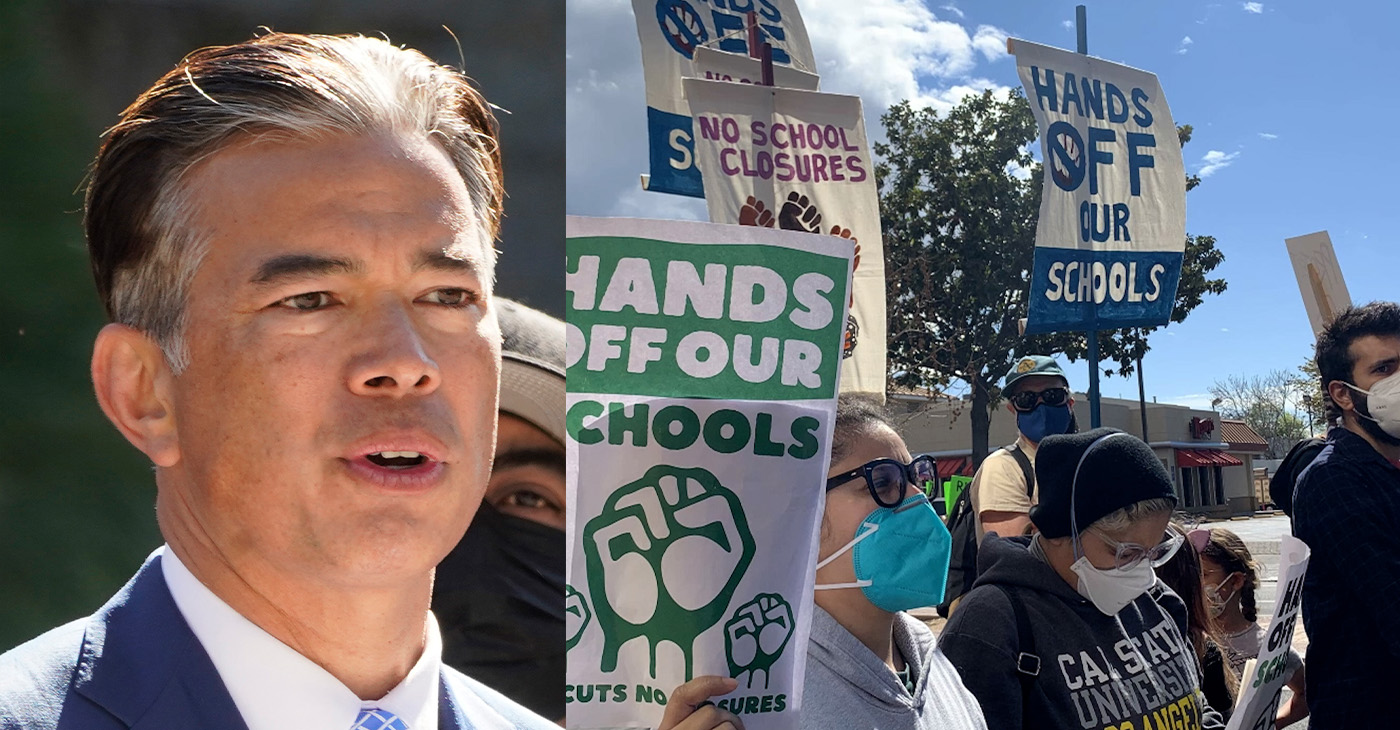
AG Bonta said DOJ investigation of 2022 closure decisions would have negatively impacted Black and low-income families.
By Post Staff
California Attorney General Rob Bonta sent a letter this week to the Oakland Unified School District (OUSD) Board of Education saying the district has a duty to comply with state education and civil rights laws to protect students and families from “disparate harm,” such as segregation and discrimination, if the district goes ahead with school closures, mergers or consolidations in 2025-2026.
The letter and an accompanying media release announced the findings of the California Department of Justice’s (DOJ) investigation into the OUSD Board’s Feb. 8, 2022, decision to close Parker Elementary, Brookfield Elementary, Carl B. Munck Elementary, Fred T. Korematsu Discovery Academy, Grass Valley Elementary, Horace Mann Elementary, and Community Day School and eliminate grades 6-8 of Hillcrest Elementary and La Escuelita Elementary.
“All school districts and their leadership have a legal obligation to protect vulnerable children and their communities from disparate harm when making school closure decisions,” said Attorney General Bonta.
“The bottom line is that discrimination in any form will not be tolerated,” he said. “I am committed to working with OUSD’s leadership to achieve successful outcomes for students.
“My office will continue to monitor OUSD’s processes and decision-making as it moves forward with the required community engagement, equity impact analysis, and planning to implement any future closures, mergers, or consolidations” to ensure compliance with California’s Constitution, AB 1912, and anti-discrimination laws.
By press time, the school district did not respond to a request for comment from OUSD.
The DOJ’s findings showed that the February 2022 decision, later partially rescinded, would have disproportionately impacted Black and low-income elementary students, as well as high-need students with disabilities, according to the media release.
The Attorney General outlined concerns about criteria OUSD has announced that it may rely on to determine future closures, mergers, and consolidations and provided recommendations to ensure OUSD does not violate state law, including prohibitions against closure decisions that reinforce school segregation or disproportionately impact any student group as required by the State Constitution, AB 1912, and anti-discrimination laws.
According to AB 1912, passed in September 2022, financially distressed school districts contemplating school closures, mergers, or consolidations must engage the community before closing schools; conduct an equity impact assessment; and provide the public with the set of criteria the district plans to utilize to make decisions.
In the letter, DOJ identified a “problematic” approach to planning for closing schools in 2025-2026 and “strongly recommends” steps OUSD should take going forward.
- “Take affirmative steps to ensure that its enrollment and attendance boundary and school closure decisions alleviate school segregation and do not create disproportionate transportation burdens for protected subgroups.”
- Don’t solely utilize criteria such as school facilities’ conditions, school operating costs, and school capacity without also including an assessment of past and present inequities in resources “due to educational segregation or other causes.”
- Some of OUSD’s proposed guidelines “may improperly penalize schools serving students with disabilities and students who have high needs.”
- The district’s decisions should also include “environmental factors, student demographics and feeder attendance patterns, transportation needs, and special programs.”
- Avoid overreliance on test scores and other quantitative data without also looking at “how each school is serving the needs of its specific student body, especially as it relates to historically marginalized communities.”
- “Engage an independent expert to facilitate community input and equity impact.”
The letter also emphasized that DOJ is willing to provide “feedback and consultation at any time during the process to ensure that OUSD’s process and outcomes are legally compliant and serve the best interests of the school community and all of its students.”
-

 Activism4 weeks ago
Activism4 weeks agoOakland Post: Week of March 20 – 26, 2024
-

 #NNPA BlackPress3 weeks ago
#NNPA BlackPress3 weeks agoCOMMENTARY: D.C. Crime Bill Fails to Address Root Causes of Violence and Incarceration
-

 #NNPA BlackPress3 weeks ago
#NNPA BlackPress3 weeks agoMayor, City Council President React to May 31 Closing of Birmingham-Southern College
-

 #NNPA BlackPress3 weeks ago
#NNPA BlackPress3 weeks agoFrom Raids to Revelations: The Dark Turn in Sean ‘Diddy’ Combs’ Saga
-

 #NNPA BlackPress3 weeks ago
#NNPA BlackPress3 weeks agoCOMMENTARY: Lady Day and The Lights!
-

 #NNPA BlackPress3 weeks ago
#NNPA BlackPress3 weeks agoBaltimore Key Bridge Catastrophe: A City’s Heartbreak and a Nation’s Alarm
-

 #NNPA BlackPress3 weeks ago
#NNPA BlackPress3 weeks agoBaltimore’s Key Bridge Struck by Ship, Collapses into Water
-

 Activism3 weeks ago
Activism3 weeks agoOakland Post: Week of March 27 – April 2, 2024




